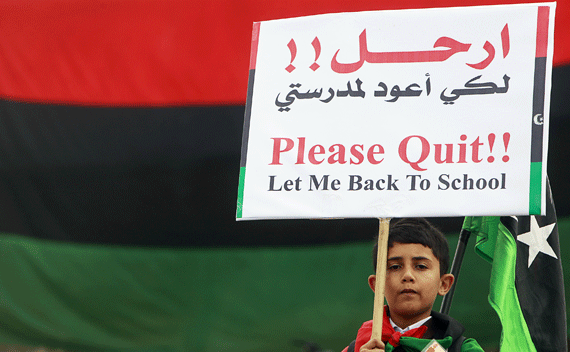U.S. Options in Libya
More on:

CNN’s GPS blog has posted my assessment of the possible steps the United States could take if Qaddafi continues to hang on in Libya.
More than two months of bombing make it clear that the United States and its NATO allies are seeking to oust Libyan strongman Muammar al-Qaddafi. The air war, however, is not producing the quick result that NATO wanted.
President Obama continues to resist European calls for a greater American commitment. He argues for sitting tight--the air war will eventually force Qaddafi from power.
Public opinion polls explain Obama’s reluctance to do more right now--Americans take a dim view of the operation. A new Quinnipiac University Poll finds that 57 percent of Americans don’t think that the United States should be involved in Libya. Democrats and Republicans are equally unenthusiastic.
But sitting tight requires patience that Americans and Europeans may not have. If domestic opposition to the air war grows, Qaddafi and his supporters might gain confidence that he can hang on, thereby undermining the bombing campaign.
What steps could the administration take if it decides that the current air war isn’t working, or working fast enough? Obama has repeatedly ruled out sending in U.S. combat troops. Given the American public’s intervention fatigue, he isn’t likely to change his mind.
So what might he do instead? Here are five possibilities:
1) Seek a negotiated solution. Washington could cut a deal with Qaddafi that imposes a ceasefire or sends him into exile. The Libyan dictator looks to be searching for such a deal.
Obama has said it is “impossible to imagine a future for Libya with Qaddafi in power.” So any deal that allows him or his sons to continue ruling, which is what a ceasefire would do, would be seen as a substantial defeat.
2) Arm the Rebels. Obama has authorized sending Libyan rebels $25 million worth of nonlethal equipment like body armor and uniforms. The British, French, and Italians have gone slightly further, providing some military advisers. Sending military arms might tip the balance in the fighting because airstrikes have seriously degraded Qaddafi’s military forces.
Arming the rebels does not guarantee a quick victory. Sophisticated weapons require training to use, and that training can take months. Washington also worries that weapons sent to Libyan rebels today could end up in the hands of anti-U.S. forces tomorrow.
3) Ask NATO allies to do more. Obama has pushed Britain and France to lead the air war. They have grumbled but complied. Britain and France have begun dispatching attack helicopters to Libya. Washington can insist they do even more.
How much more NATO allies can and will do, though, is an open question. The capacity of some contributing countries is already being tested, and European capitals share Washington’s reluctance to wade deeper into Libya. So pushing Europe to do more could strain the transatlantic alliance
4) Expand the air war. NATO could expand its target list to put more pressure on Qaddafi’s supporters. It also could use airpower to support rebel fighters on the ground. Britain and France want the United States to commit roughly ten close air support aircraft to the fight. These AC-130 and A-10 planes were used early in the fighting to destroy Qaddafi’s tanks.
Two months of bombing have destroyed most of Libya’s militarily significant targets. Qaddafi’s forces now avoid airstrikes by hiding amongst civilians. Widening the target set or sending in close air support aircraft risks killing more civilians and undermining domestic support for the air war.
5) Send in Special Forces. Navy SEALs raided Osama bin Laden’s compound in Abbottabad, Pakistan. They could try to replicate that feat in Tripoli.
The Abbottabad raid worked because the United States had exceptional intelligence on bin Laden’s whereabouts as well as the element of surprise. Precise information about Qaddafi’s location is hard to come by, and Special Forces wouldn’t have surprise working for them. A raid that turned into Blackhawk Down rather than Abbottabad would hand Qaddafi a major political victory.
Even as Obama struggles with how to push out Qaddafi, he has to contemplate a bigger challenge: what to do once he is gone. Iraq offers a cautionary lesson that it is far easier to topple dictators than it is to install just and effective governments.
Which option do you favor? Is there an option you think I missed?
More on:
 Online Store
Online Store
